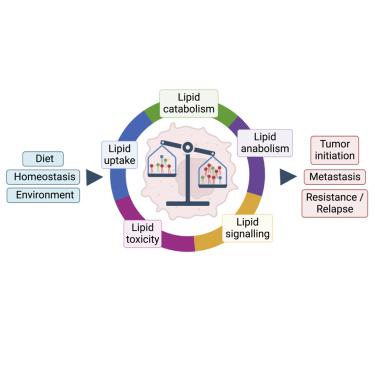Cell Metabolism ( IF 27.7 ) Pub Date : 2022-10-18 , DOI: 10.1016/j.cmet.2022.09.023
Miguel Martin-Perez 1 , Uxue Urdiroz-Urricelqui 2 , Claudia Bigas 2 , Salvador Aznar Benitah 3

|
Lipids have essential biological functions in the body (e.g., providing energy storage, acting as a signaling molecule, and being a structural component of membranes); however, an excess of lipids can promote tumorigenesis, colonization, and metastatic capacity of tumor cells. To metastasize, a tumor cell goes through different stages that require lipid-related metabolic and structural adaptations. These adaptations include altering the lipid membrane composition for invading other niches and overcoming cell death mechanisms and promoting lipid catabolism and anabolism for energy and oxidative stress protective purposes. Cancer cells also harness lipid metabolism to modulate the activity of stromal and immune cells to their advantage and to resist therapy and promote relapse. All this is especially worrying given the high fat intake in Western diets. Thus, metabolic interventions aiming to reduce lipid availability to cancer cells or to exacerbate their metabolic vulnerabilities provide promising therapeutic opportunities to prevent cancer progression and treat metastasis.
中文翻译:

脂质在癌症进展和转移中的作用
脂质在体内具有重要的生物学功能(例如,提供能量储存、充当信号分子以及作为膜的结构成分);然而,过量的脂质会促进肿瘤发生、定植和肿瘤细胞的转移能力。为了转移,肿瘤细胞会经历不同的阶段,这些阶段需要与脂质相关的代谢和结构适应。这些适应包括改变脂质膜组成以侵入其他生态位和克服细胞死亡机制,以及促进脂质分解代谢和合成代谢以达到能量和氧化应激保护目的。癌细胞还利用脂质代谢来调节基质细胞和免疫细胞的活性,使其发挥优势,抵抗治疗并促进复发。鉴于西方饮食中的高脂肪摄入量,所有这些尤其令人担忧。因此,旨在降低癌细胞脂质可用性或加剧其代谢脆弱性的代谢干预措施为预防癌症进展和治疗转移提供了有希望的治疗机会。































 京公网安备 11010802027423号
京公网安备 11010802027423号